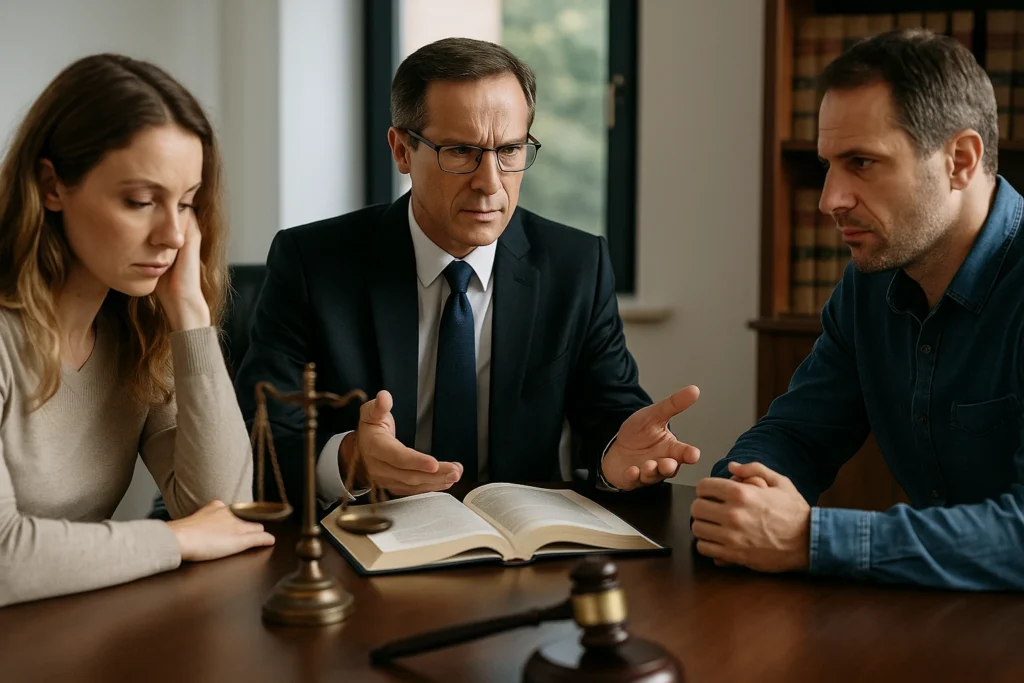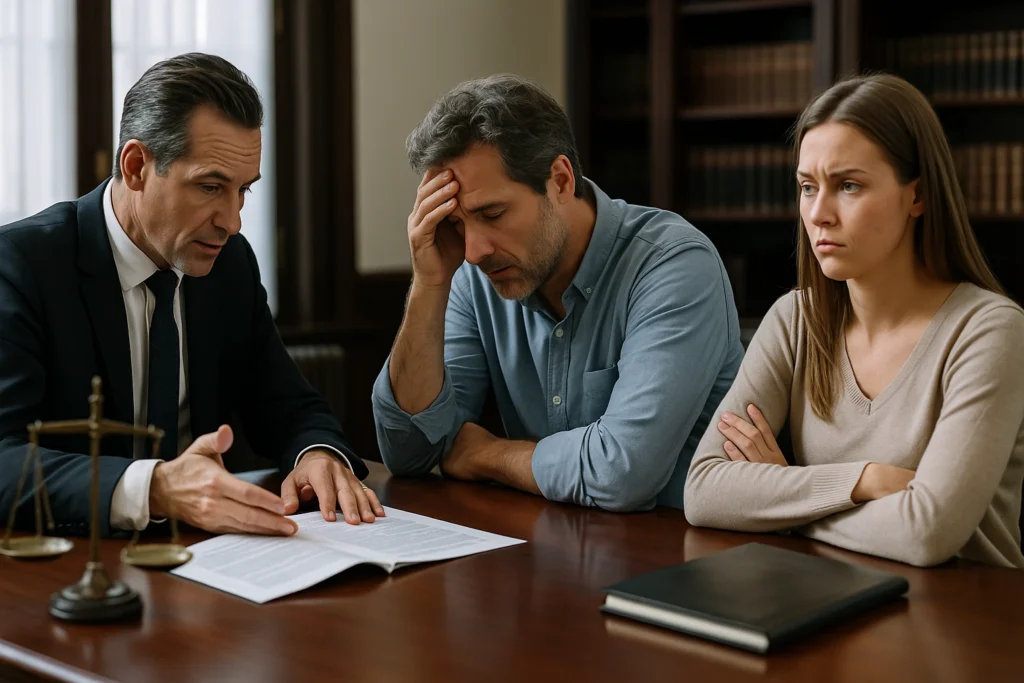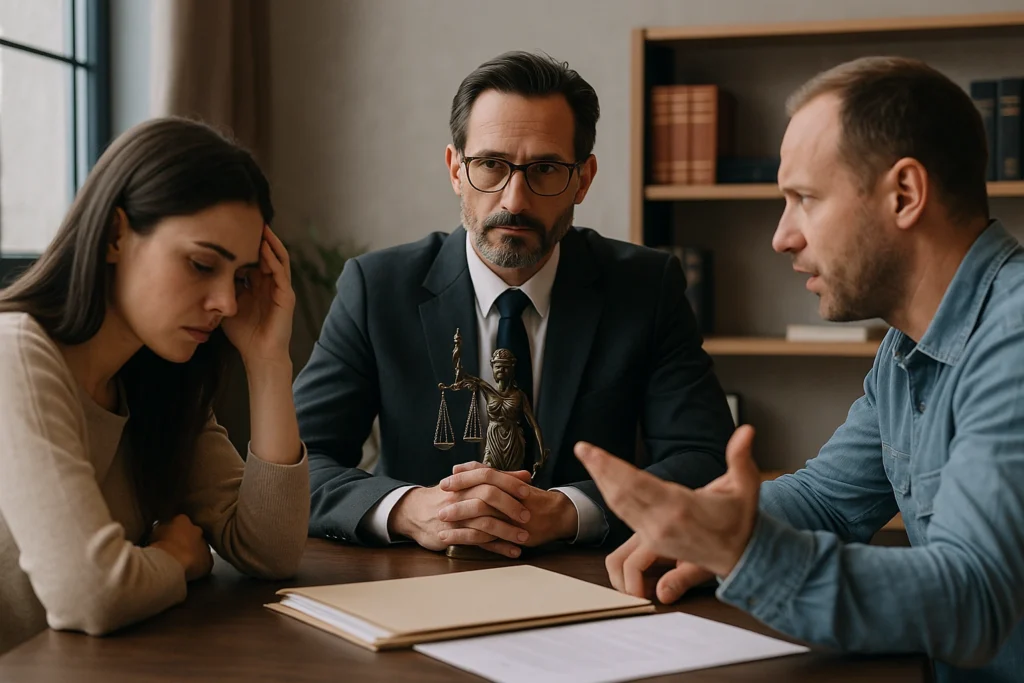
Divorce brings big decisions, and one of the first is whether to hire legal help or go it alone. Some people want the guidance of a lawyer, while others worry about the cost or losing control. The choice often depends on the case itself, how well both sides get along, and what’s at stake. Understanding the advantages and disadvantages of using an attorney when divorcing helps you decide what fits your situation best.
Advantages of Hiring an Attorney
You Get Legal Protection
An attorney helps protect your rights during a divorce. They understand how the court works and know how to apply the law to your case. This becomes especially important when your spouse has already hired legal representation.
Legal professionals can also catch issues you may overlook, like hidden assets or unfair parenting schedules. Without legal support, you might agree to terms that seem fair but hurt you in the long run.
You Avoid Costly Mistakes
Divorce paperwork involves court deadlines, required forms, and specific legal language. Missing a step or signing something without understanding it can cause delays, fines, or unfavorable outcomes.
Attorneys check every document before filing. They help divide assets properly and protect your interests in child custody, spousal support, and retirement benefits. Their attention to detail helps avoid errors that could lead to future disputes.
You Save Time in the Long Run
Divorces that begin as simple can quickly become messy. Misunderstandings turn into arguments. Delays pile up when forms are incomplete or missing. Attorneys handle the legal tasks so you don’t waste time figuring everything out on your own.
Though some divorces still take months, an attorney speeds up the process by staying organized, meeting court deadlines, and communicating with the other side clearly.
You Feel Less Overwhelmed
Legal separation already brings stress, especially when children or shared property are involved. An attorney lightens the burden. They handle negotiations, prepare court filings, and deal with your spouse’s attorney.
This gives you space to focus on your well-being and decisions that matter. You don’t have to guess what to do next or worry about saying the wrong thing in court.
You Have Someone Who Speaks for You
Divorce can feel like a battle. Emotions run high, and communication breaks down. An attorney steps in to speak on your behalf. They bring objectivity and help prevent your emotions from influencing important decisions.
If your case goes to trial, a lawyer presents your side with logic and clarity. Judges listen carefully to strong legal arguments, not just emotional pleas. An attorney helps present your case in a way the court respects.

Disadvantages of Hiring an Attorney
It Costs Money
One of the biggest reasons people avoid attorneys during divorce is cost. Legal fees add up quickly. Most attorneys charge by the hour, and longer cases mean higher bills.
Even flat-fee divorces can still end up costing thousands of dollars. If your divorce is uncontested and both sides agree on everything, spending money on an attorney may not feel worth it.
Still, trying to save money by skipping legal help can sometimes lead to bigger financial problems later. A poorly written agreement can cause confusion, court battles, or missed benefits.
It Can Increase Conflict
Sometimes, involving lawyers makes things worse. If both parties hire aggressive attorneys, negotiations can turn into power struggles. Instead of working together, each side tries to win.
This can create tension, especially in divorces where children are involved. Fighting through lawyers might delay resolution and make co-parenting harder.
That’s not always the case, though. Some attorneys encourage peaceful outcomes through settlement or mediation. The key is choosing someone who understands your goals and works to support them.
You Might Rely Too Much on the Attorney
Hiring an attorney doesn’t mean you stop making decisions. Some people hand over too much control and let their attorney run the show. This can backfire if the attorney’s strategy doesn’t match your goals.
Staying involved matters. You should understand what’s happening in your case and speak up when something doesn’t feel right. The best outcomes happen when you and your attorney work together, not when you sit back and stay silent.
You May Feel Disconnected
Legal language can feel cold. Divorce already involves a lot of emotion, and lawyers tend to focus on facts and court procedures. This might leave you feeling unheard or rushed through the process.
Some attorneys talk in legal terms that don’t make sense to clients. If they fail to explain things clearly, you may feel left out or confused. Communication matters, and if your attorney doesn’t take time to explain things, that could become a problem.

You Could Lose Control of the Process
Once attorneys step in, they usually follow formal legal steps. This means court filings, scheduled hearings, and standard responses. If you hoped to settle things privately, the process could become more public and structured than expected.
Even when attorneys mean well, the legal process can feel rigid. If you want more flexibility or creativity in your divorce agreement, going through mediation or handling the divorce yourself may offer better control.
When It Makes Sense to Hire an Attorney
Some divorces involve serious issues that require legal help. Here are situations where hiring an attorney makes a lot of sense:
- You and your spouse fight over custody or parenting time
- One spouse earns much more than the other
- You suspect your spouse hides assets
- You or your spouse own a business or rental properties
- One person tries to manipulate or pressure the other
These cases often involve high stakes. Trying to handle them without support could leave you with unfair terms or ongoing legal battles.
When You Might Not Need an Attorney
Not every divorce needs legal representation. If both sides agree on everything and have no major assets, you may handle the divorce on your own or with a mediator.
This often works best when:
- You don’t have children
- You don’t share major debt or property
- You agree on how to divide everything
- You can speak with each other respectfully
Many states offer self-help divorce packets with step-by-step instructions. You can also consult a lawyer for limited help, such as reviewing your agreement or answering specific questions, without hiring them for full representation.
Final Thoughts
Hiring an attorney during divorce comes with pros and cons. For some, legal help brings peace of mind, stronger protection, and fewer mistakes. For others, the cost and loss of control outweigh the benefits.
If you’re thinking about getting a divorce, ask yourself how complex your situation is, how much conflict exists, and what kind of support you need. Then decide if hiring an attorney helps or hurts your goals.
A clear decision helps you move forward with less stress and better results.

Ebook
![Adobe Stock 62844981[2]](https://www.bryanfagan.com/wp-content/uploads/2023/09/AdobeStock_628449812.jpeg) If you want to know more about what you can do, CLICK the button below to get your FREE E-book: “16 Steps to Help You Plan & Prepare for Your Texas Divorce”
If you want to know more about what you can do, CLICK the button below to get your FREE E-book: “16 Steps to Help You Plan & Prepare for Your Texas Divorce”
![Divorce Wasting Assets[4]](https://www.bryanfagan.com/wp-content/uploads/2023/09/Divorce-wasting-assets4.jpeg) If you want to know more about how to prepare, CLICK the button below to get your FREE E-book: “13 Dirty Tricks to Watch Out For in Your Texas Divorce, and How to Counter Them” Today!”
If you want to know more about how to prepare, CLICK the button below to get your FREE E-book: “13 Dirty Tricks to Watch Out For in Your Texas Divorce, and How to Counter Them” Today!”
Other Related Posts
- The Special Magistrate and Unveiling their Unique Role
- Understanding parental rights and Responsibilities in Texas
- Understanding the Role and Functions of Court Magistrates
- The Secrets to Creating Successful Texas Parenting Plans
- Exploring the Indictment Process
- Anticipate what your narcissist spouse will do concerning your Texas divorce
- What is The Divorce Rate After Therapy?
- What is The Success Rate of Marriage Counseling?
- What is The Main Goal of Marriage Counseling?
- What are The Three Forms of Discovery?
- What is Included in a Discovery?
- What Does Discovery Show in a Divorce?
- Child Support in Texas: From Guideline Levels to Ending Obligations and Everything In Between
- Safeguarding Child Witnesses
- Overcoming Obstacles in Divorce: How a Qualified Attorney Can Help
FAQs
In some cases, yes. If you and your spouse can agree on all issues, such as asset division, child custody, and support, you may be able to pursue a collaborative divorce or a mediated divorce, which may not require a court appearance.
The division of assets will depend on the laws in your jurisdiction and whether it is a community property or equitable distribution state. Typically, marital assets are divided fairly, but not necessarily equally.
Alimony and child support determinations depend on various factors, including each spouse’s income, financial needs, and the custody arrangement. An attorney can help you understand your rights and obligations.
Child custody refers to the legal and physical responsibility for a child. Courts consider the best interests of the child when determining custody arrangements, which can be joint or sole custody.




